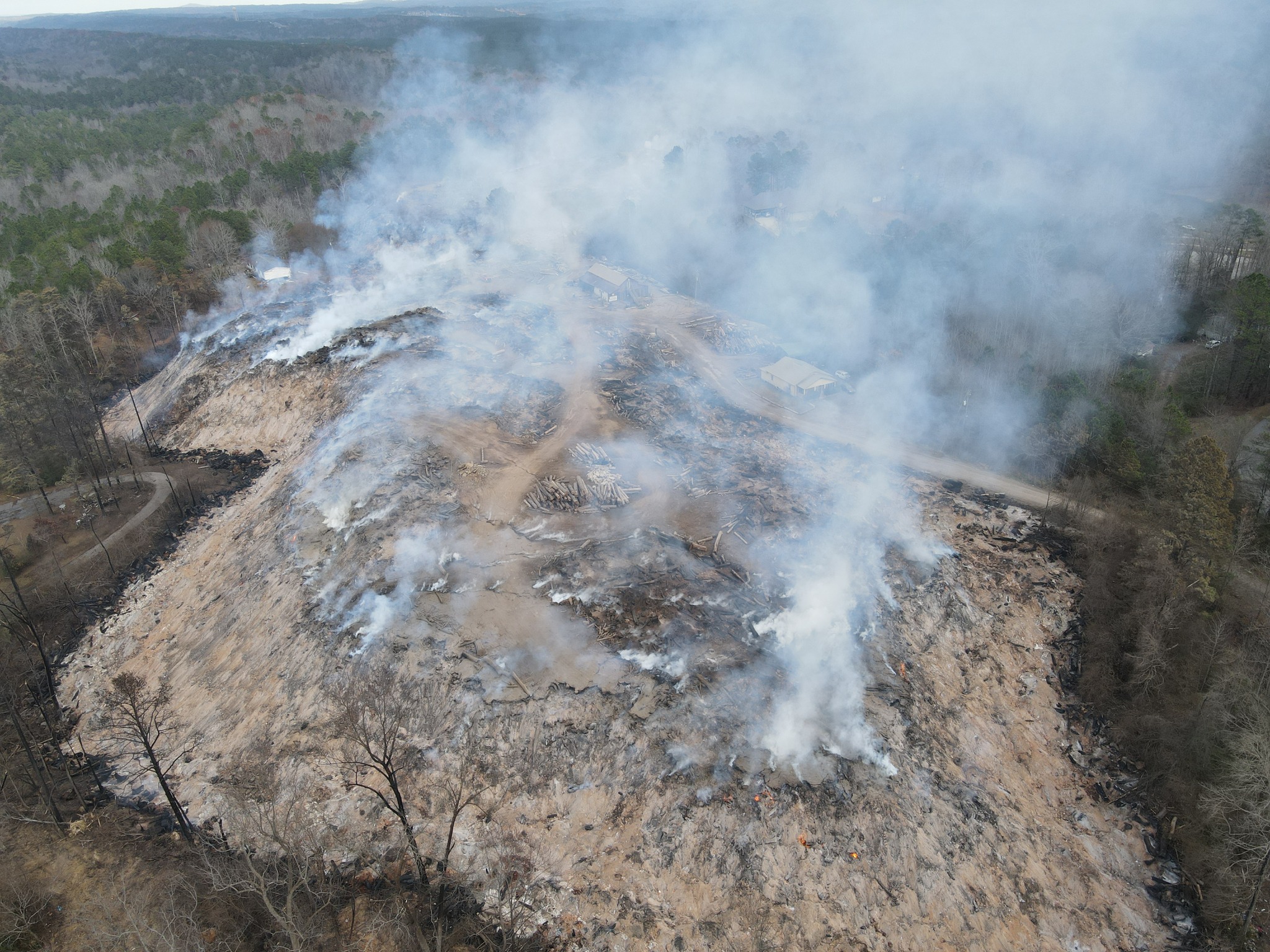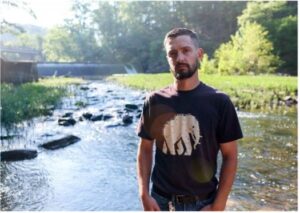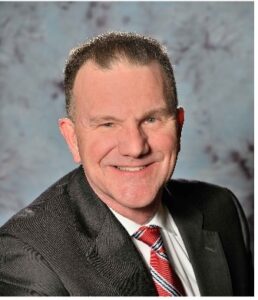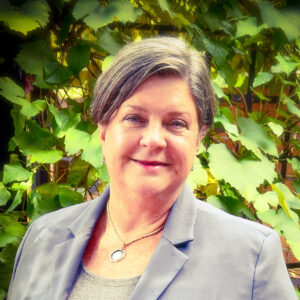Apply now to join our next cohort of Community Science Fellows and Community Leads!

default
The Moody Unauthorized Dump Site (MUDS) has been smoldering for years, forcing nearby residents to live with persistent air quality hazards and chronic health concerns. This project aims to implement an independent air quality monitoring program to detect harmful chemicals like benzene that are being released from the site and threatening community safety. The air quality monitoring campaign will contribute to a holistic report on the environmental hazards associated with MUDS and is one step on the way towards the overarching goal to put out the fire and allow residents to feel safe in and around their homes. We expect that with the right people and the right measurements, the urgency of the situation will become clearer to the EPA and to others with the resources to properly manage the issue.
MUDS is situated in a suburban neighborhood near the border of Alabama’s Jefferson and St. Clair counties. Homes directly adjacent to the site were initially impacted when open flames and suffocating smoke engulfed the dump in November of 2022. Since this time, the fire has continued smoldering underground with periodic eruptions of smoke or flames. Residents who have been displaced or suffered health consequences and who are disappointed with the Alabama Department of Environmental Management’s and EPA’s responses have come together to take matters into their own hands. Additional residents living downwind of the dump continue to be impacted by exposure to hazardous fumes wafting from the MUDS. The community, however, is not uniformly mobilized, with some residents preferring to avoid publicizing the issue now that the open flames have subsided.
The EPA has conducted minimal benzene monitoring efforts, mostly on the ridgelines surrounding the MUDS. Levels around 0.28 ppm have been detected consistently, just below the 0.30 ppm threshold that the EPA considers hazardous. More recently, the agency placed an additional benzene detector at the Community Lead’s home, but many more are needed, especially in the downwind areas not directly adjacent to the landfill. The EPA has also conducted an aerial infrared survey of the landfill site, revealing continued smoldering beneath a layer of soil cover. It is clear to community members, who report being able to smell the fumes from the landfill, that the sensors are not detecting the bulk of pollutants since air tends to pool in the lower areas closer to homes, especially during the wintertime. Recent improvements in regional EPA leadership hold promise for action on this issue, and at this point, the community feels that the EPA can be an ally if sufficient pressure is applied. Finally, the Cahaba Riverkeepers have already detected harmful PFAS chemicals in surface water draining the MUDS site.
The community would like to implement an independent air quality monitoring program that is sensitive to local conditions. We hope to work with a scientist in designing a confidence-inspiring hazards monitoring plan that could combine an analysis of local airflow patterns with the knowledge and concerns already existing in the community. Because this work will be carried out in residential areas, the Community Leads will be vital in obtaining permission from residents to sample their properties.
In addition to generating new air quality data, the community would like to work with the Volunteer Scientist(s) on compiling and interpreting other existing datasets, including water chemistry and blood/urine samples, both of which are being collected by the Cahaba Riverkeepers. With these datasets and others relevant information determined by the scientist’s professional expertise, we will produce a holistic but accessible environmental toxicology report documenting the harm posed by the MUDS fire. In this way, the Thriving Earth Exchange project will complement other work already taking place in the community.
The components of this report will come together at a community meeting, where Community Leads and collaborators will also work to collect personal testimonies from people who have been affected by the MUDS fire. A final report will include these narratives alongside the outcomes of the environmental and human health studies. Transparency and communication with the broader community is therefore vital for the project’s success and a stand-alone outcome.
The result of this project will be a scientifically sound, community supported, and widely comprehensible report of the hazards and experiences surrounding the MUDS fire. The community sees this is a vital step in corralling broader public support, getting accurate news reporting on the issue, and ultimately pressuring the EPA or other Federal programs to invest resources towards remediation.
Residents report that it is during the winter months that cool air pooling increases their exposure to toxic fumes. It is urgent that the air quality sensors be installed as soon as possible. This is the number one priority. The community meeting will take place after data collection, with potential for smaller gatherings at the onset of the project.
Broader community outreach is already being carried out by concerned residents and will continue as the project progresses.
Richard Harp is a resident adjacent to the moody landfill fire. He and his family have been forced to leave their home since January of last year. He is a minister for the Deerfoot church of Christ in Pinson Alabama and former firefighter and fire chaplain. This background has helped in community outreach and a basic understanding of the dangers associated with the Moody landfill fire. He has been a source of contact for the EPA, and State legislators.

Marc Sparber is a resident of the Moody, AL community and is very concerned about the health impact of the Moody Unauthorized Dump Site Fire on the residents in the immediate vicinity and that of the nearby communities’ residents. Marc is the current President of the Trussville Business Network International Chapter. He has a diverse background in many industries including criminal justice training & investigating, network engineering, home services industry experience, sales, and marketing management. Marc believes that purpose is found in serving people and getting things done.

David Butler is a long-time volunteer and board member for the Cahaba Riverkeepers and became their staff attorney in 2018 after earning his J.D. from the Birmingham School of Law. Beyond his responsibilities as a lawyer, David oversees the Riverkeepers’ Swim Guide Program, organizes river cleanups, responds to pollution complaints, manages intensive data collection efforts, communicates with the public about these and other Riverkeeper efforts. David is a recreational user of the Cahaba River and is committed to maintaining a healthy environment in and around the river.

Andrew “Drew” Bailey, REM, CSRP, is the President of ECA Risk Management, an environmental risk management firm. He is also a former adjunct professor at Samford University for their Graduate Environmental Management course. Drew enjoys giving back to the community with his time and God given talents. He is very troubled about the health and environmental impacts of the Moody Unauthorized Dump Site (MUDS), which is not a landfill, on the residents in the immediate vicinity and the surrounding communities. Drew is disturbed about the lack of urgency in the response by the governmental regulatory agencies.

From Cleveland, OH, Tal Shutkin is a graduate student at the Ohio State University Department of Geography and Byrd Polar and Climate Research Center. He is interested in environmental change in cold regions and focuses on glacier dynamics in the high mountain tropics. Prior to this, he worked coordinating community science programs with tribes along Alaska’s Yukon River.

Kathleen Kirkpatrick is an environmental engineer and climate activist with a passion for helping rural communities in the South become more resilient and sustainable. She grew up mostly in Alabama, left the region to attend college and pursue a career in environmental protection, then returned in 2012 after her hometown of Tuscaloosa was devastated by a tornado. A dedicated advocate for environmental and social justice, Kathleen earned a bachelor’s degree in chemical and ocean engineering from the University of Rhode Island and pursued graduate studies in sustainable building and Biomimicry. With a diverse career ranging from environmental policy, sustainability education, and nonprofit management to movement politics, she continues to work collaboratively with others in the climate & environmental justice movement towards a Just transition for Southern communities. She serves on the board of directors for Coosa Riverkeeper, the Alabama Sustainable Agriculture Network (ASAN), and the Alabama Center for Rural Organizing and Sustainable Solutions (ACROSS).
We are seeking a scientist or team of scientists willing to work collaboratively with community members and who have the expertise to design and implement a monitoring network for air quality hazards associated with the MUDS fire. This means that while expertise is necessary for planning the monitoring efforts, the scientist does not necessarily need to be the primary field technician. Local technicians may be available through our collaborating organizations. While tracking benzene exposure is a priority, the scientific expert may deem it worthwhile to monitor a broader suite of hazards, including surface or groundwater contamination with consultation from the Cahaba Riverkeepers. Finally, the monitoring plan will ideally address the shortcomings of previous EPA efforts. Specifically, it should show responsiveness to local knowledge and concerns and be informed by an analysis of the dominant local air flow patterns and their seasonal variability.
A local scientist is preferred to allow access to the site, but this is not required. Students are welcome to be involved in the project, however, any fieldwork they would be involved in would require permission from private property owners. Scientists motivated to conduct a holistic environmental hazards/toxicology analysis based on available data but who do not have the necessary instrumentation for benzene detection are still welcome to join our team, especially if local.
Thriving Earth Exchange asks all scientific partners to work with the community to help define a project with concrete local impact to which they can contribute as pro-bono volunteers and collaborators. This work can also position the scientists and communities to seek additional funding, together, for the next stage.
Cahaba Riverkeepers
The Cahaba Riverkeepers are a community organization dedicated to the health of the Cahaba River watershed, where the MUDS is located. The Riverkeepers are leading studies that complement our efforts, including monitoring water quality hazards and conducting blood and urine toxicology tests for concerned community members.
ECA Risk Management
ECA Risk Management is Birmingham, AL based an environmental risk management firm. The company is providing expertise in the technical, risk management, and regulatory context of MUDS.
(c) 2024 Thriving Earth Exchange